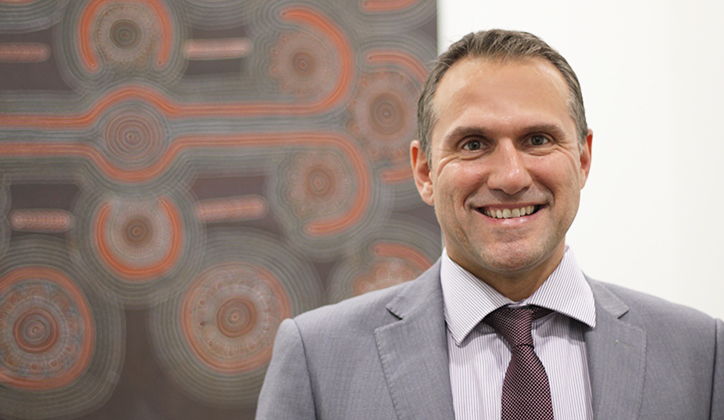Associate Professor Shane Hearn brings a wealth of knowledge and expertise to the newly created role of Director, Indigenous Strategy.
We asked Associate Professor Hearn a number of questions about his academic background, aspirations for the new role and the challenges that lie ahead.
What’s the elevator pitch/layman’s version of your academic background and expertise?
As an undergrad I completed a BAppSc and then a Masters in Public Policy. These were essential groundwork for my PhD in which I advanced the concept of resilience in a school-based sample of Indigenous and non-Indigenous students aged 13 to 17 years across NSW. I examined the relationship of resilience to young people’s demographic characteristics, psychological, social and physical environments, and to their risk behaviours (tobacco use, alcohol consumption and physical activity), to mental health, their perceptions of and attitudes to school, and to the extent of their peer and community engagement.
An unexpected research outcome was that socioeconomic status explains the majority of the deprivation experienced by Indigenous people, not Aboriginality. My doctoral research also demonstrated that educational achievement, together with peer and community engagement builds young people’s resilience – hence, my commitment to working in the higher education sector.
I have spent most of work life as a Public Health practitioner and academic. Through my teaching I built the capacity of the health workforce to promote health and to provide high quality health care in culturally-safe environments. Through my research and consultancy I have published papers in journals and written book chapters and reports on policy, health promotion, equity, and the implementation and evaluation of state and national health campaigns, including a smoking cessation intervention program and the Live Longer! Campaign.
How did you come to be at Macquarie?
I have worked in the university system for more than a decade and left in 2011. When in the university system, I combined my activities between being an academic and working to develop the University of Sydney’s Indigenous strategies. After a break and working in corporate Australia to obtain private sector experience, I realised how much I missed the higher education sector and its importance in developing a better Australia. I am passionate about the opportunities that universities in general can and do offer Aboriginal and Torres Strait peoples. Universities can play an even bigger role in ‘Closing the Gap’. The opportunity to make a contribution and represent Macquarie in this capacity was just too irresistible. I am excited to be here and honoured to be the first person appointed as the Director, Indigenous Strategy.
What do you hope to achieve in the new role?
In a nutshell within and external to the university, I hope to establish and build strategic alliances and relationships based on mutual respect and mutual purpose that lead to the improvement of higher education outcomes among Indigenous people. Macquarie has made important early strides in practical outcomes that make a difference. By building on these beginnings, I will work alongside committed non-Aboriginal and Aboriginal colleagues to find new ways of opening the door to a university education. Critical to all this will be a new song line for the student experience: one for which I hope Macquarie will set a new benchmark. There’s a very good news story in student experiences and telling the world about the power of higher education to eliminate Indigenous disadvantage.
What are the hot topics for a Director, Indigenous Strategy?
Well they are numerous – some of the more immediate ones include an audit of Macquarie’s Indigenous student intake, increasing numbers of Indigenous students, and enhancing employment opportunities within the university sector for Indigenous Australians.
What do you see as the opportunities and challenges for Macquarie in the next 5-10 years?
I believe that the challenges and opportunities are somewhat intertwined. A key challenge for the higher education sector overall is to develop a University model that optimises the quality of teaching and learning for students, as well as maximising the recruitment, progression, retention and completion rates of Indigenous students/staff across the breadth of University programs. Australian Universities are trying to define the characteristics of an ideal model which could then be adapted according to each university’s strengths and strategic directions. I see real opportunity to build on the strengths and experience of the work to date and to strengthen relationships and partnerships within and beyond Macquarie, with communities and key organisations. Macquarie has a lot to offer Indigenous students and also to non-Indigenous students who want to connect with and learn about Indigenous culture. I believe we are well placed to play a leadership role in contributing to this process over the next 5 to 10 years. The possibilities are truly exciting. I hope anyone with an idea or suggestion they’d like to share will get in touch with me. Together we can make a difference.
Find out more about Indigenous Advancement at Macquarie.
Find out more about the Department of Indigenous Studies (Warawara).

